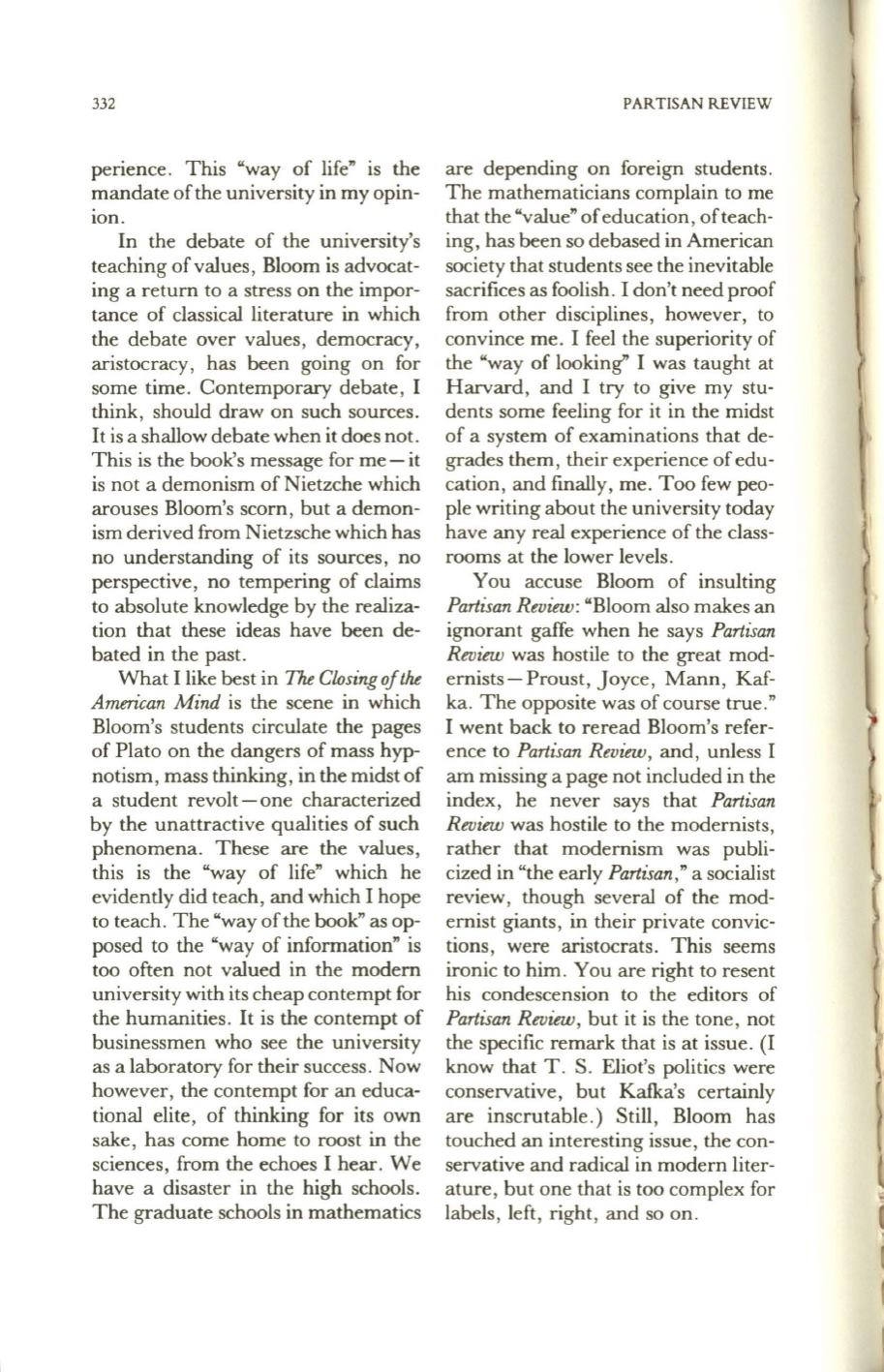
332
perience . This "way of life" is the
mandate of the university in my opin–
ion .
In the debate of the university's
teaching of values, Bloom is advocat–
ing a return to a stress on the impor–
tance of classical literature in which
the debate over values, democracy,
aristocracy, has been going on for
some time . Contemporary debate, I
think, should draw on such sources.
It is a shallow debate when it does not .
This is the book's message for me-it
is not a demonism of Nietzche which
arouses Bloom's scorn, but a demon–
ism derived from Nietzsche which has
no understanding of its sources, no
perspective, no tempering of claims
to absolute knowledge by the realiza–
tion that these ideas have been de–
bated in the past.
What I like best in
The Closing of
the
American Mind
is the scene in which
Bloom's students circulate the pages
of Plato on the dangers of mass hyp–
notism, mass thinking, in the midst of
a student revolt - one characterized
by the unattractive qualities of such
phenomena. These are the values,
this is the "way of life" which he
evidently did teach, and which I hope
to teach. The "way of the book" as op–
posed to the "way of information" is
too often not valued in the modern
university with its cheap contempt for
the humanities. It is the contempt of
businessmen who see the university
as a laboratory for their success. Now
however, the contempt for an educa–
tional elite, of thinking for its own
sake, has come home to roost in the
sciences, from the echoes I hear. We
have a disaster in the high schools.
The graduate schools in mathematics
PARTISAN REVIEW
are depending on foreign students.
The mathematicians complain to me
that the "value" ofeducation, ofteach–
ing, has been so debased in American
society that students see the inevitable
sacrifices as foolish. I don't need proof
from other disciplines, however, to
convince me. I feel the superiority of
the "way of looking" I was taught at
Harvard, and I try to give my stu–
dents some feeling for it in the midst
of a system of examinations that de–
grades them, their experience of edu–
cation, and finally, me. Too few peo–
ple writing about the university today
have any real experience of the class–
rooms at the lower levels .
You accuse Bloom of insulting
Partisan Review:
"Bloom also makes an
ignorant gaffe when he says
Partisan
Review
was hostile to the great mod–
ernists-Proust, Joyce, Mann, Kaf–
ka. The opposite was of course true."
I went back to reread Bloom's refer–
ence to
Partisan Review,
and , unless I
am missing a page not included in the
index, he never says that
Partisan
Review
was hostile to the modernists,
rather that modernism was publi–
cized in "the early
Partisan,"
a socialist
review, though several of the mod–
ernist giants, in their private convic–
tions, were aristocrats. This seems
ironic to him. You are right to resent
his condescension to the editors of
Partisan Review,
but it is the tone, not
the specific remark that is at issue. (I
know that
T.
S. Eliot's politics were
conservative, but Kafka's certainly
are inscrutable .) Still, Bloom has
touched an interesting issue, the con–
servative and radical in modern liter–
ature, but one that is too complex for
labels, left, right , and so on.


